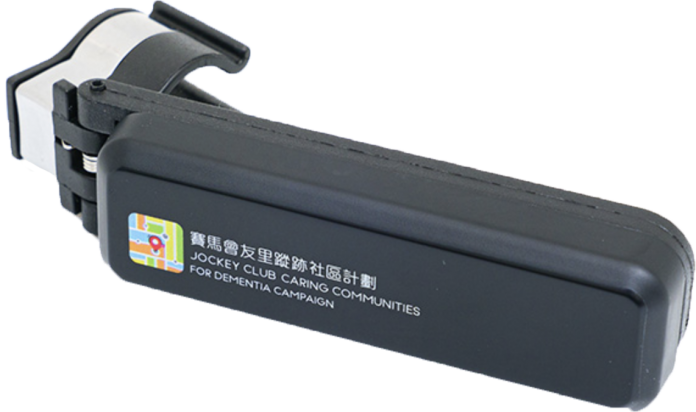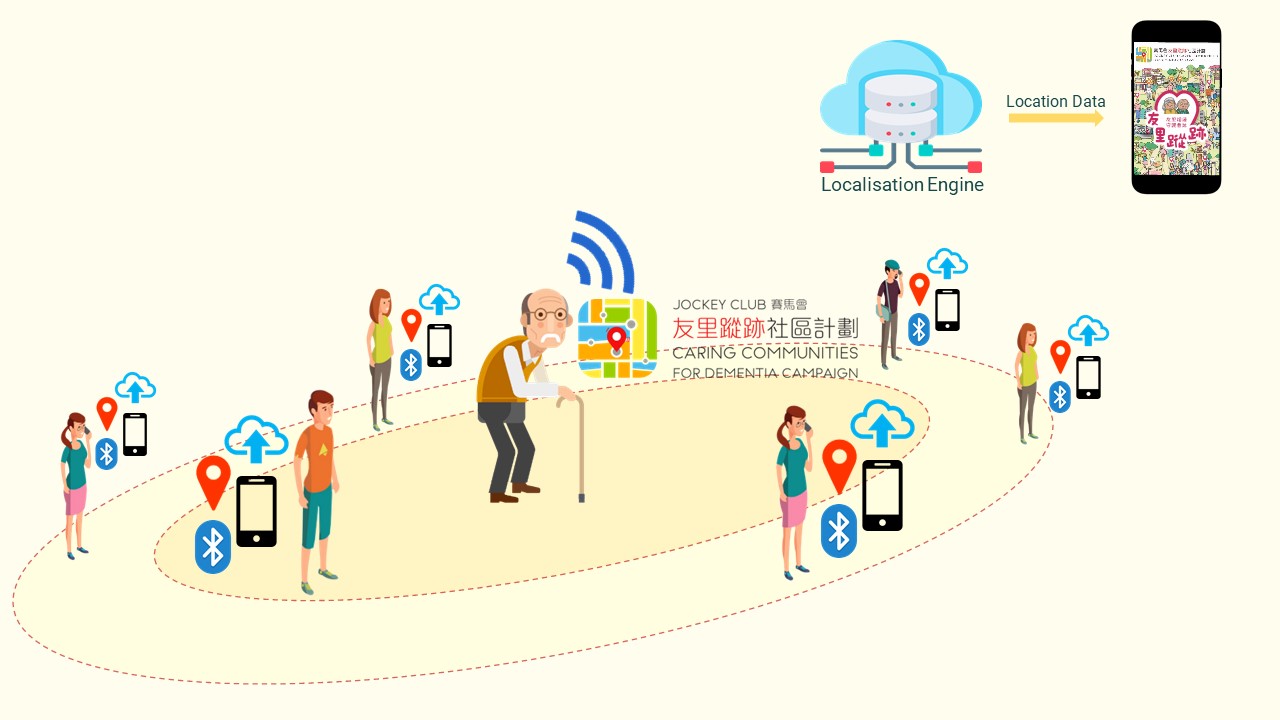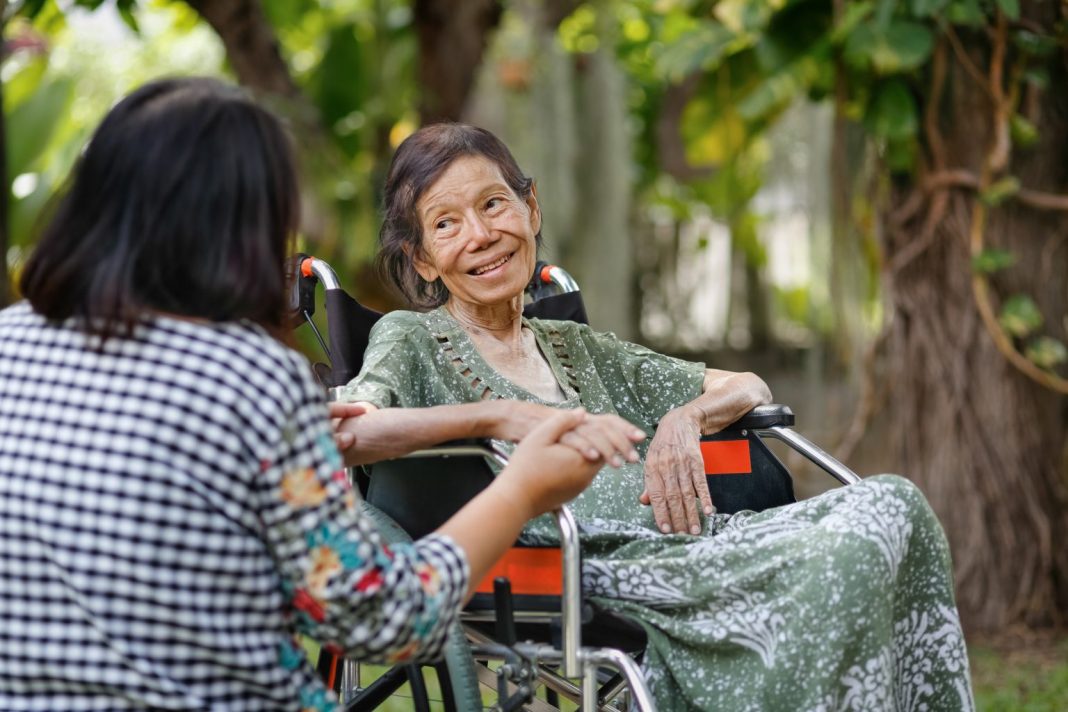Getting lost can affect caregivers and families of older people with dementia – now, a Bluetooth tracking device can assist the search for their loved ones
Getting lost affects the quality of life of community-dwelling older people with dementia and their caregivers.

A phone survey of 251 family caregivers of people with dementia(1) found that the prevalence of getting lost among community-dwelling people with dementia was 28%, and the getting lost episodes usually happened from 2 pm to 6 pm (39%) and 6 am to 12noon (28%).
Places prevalent for older people with dementia getting lost were street (24%) and their own homes (18%). 61% of respondents would search for the care recipients in the neighbourhood, and 12% would seek help from friends and neighbours. It was also found that 46% of care recipients were found within one hour of missing and 96% were found within 24 hours.
People who get lost generally go to places where other people are
From this data, we learn that when a person with dementia gets lost, they are more likely to be in the streets during the day with people around. Neighbourhoods may therefore be a good source of help, given that nearly half of missing care recipients could be found within one hour i.e. not far from the places they get lost.
In this regard, education to the general public would have significance that the community would be educated to be aware of this issue and empowered to offer help in case they meet older people with dementia getting lost.
The afore-mentioned survey indicated that nearly half (45%) of caregivers would get worried about future getting lost episodes and 30% of caregivers would forbid care recipients from going out again in order to prevent potential getting lost.
However, such restriction would cast an adverse influence on the mobility and psychological well-being of care recipients, while, there are various adaptive measures to help prevent walking and getting lost other than restriction of care recipients going out.2

“iBeacon” for a fast and helpful response
Thanks to the donation from The Hong Kong Jockey Club Charities Trust, Jockey Club Centre for Positing Ageing collaborated with The Hong Kong University of Science and Technology and St James Settlement to develop a tracking device using blue tooth and crowdsourcing machine learning technology in the “Caring communities for dementia campaign”.
The tracking device “iBeacon” we developed has a fast response (beacon interval being 1s) and up to 50m tracking distance. It is battery-saving (battery life being 1 year) and is designed in different forms so that it can be put into a wallet or attached to a walking stick to lower the resistance of people with dementia to carry the device.
When a person with dementia is getting lost, his or her caregivers could activate the missing alert on the app installed on the caregiver’s mobile phone. And then the “dementia angels” who have installed the tracking app on their mobile phones will be notified to turn on their Bluetooth for iBeacon searching and GPS for location sharing.
When the dementia angels’ mobile phones detect the iBeacon, their location would be anonymously sent to our cloud server and our localization engine would calculate the location of the iBeacon which would then be sent to the caregivers to help their searching. Such technology not only facilitates family caregivers’ search for the lost relatives with dementia but also promotes dementia friendliness community by mobilising the public to help older people with dementia who get lost.

75% thought that the designated mobile app was easy to use
Over 2,300 people have obtained our iBeacons in this project and over 23,400 dementia angels have downloaded our app to help the searching. In 45 out of 131 lost episodes recorded, the caregivers used our technology to help search for their relatives with dementia.
The caregivers participating in our project welcomed the technology and the tracking device. 87% of caregivers thought that the iBeacon was easy for the people with dementia to carry, 82% observed that their relatives with dementia were willing to carry the iBeacon during the intervention period.
79% of caregivers were satisfied with the durability of the iBeacon, and 75% thought that the designated mobile app was easy to use. In addition, 74% of caregivers trusted data security. The overall programme satisfaction rate was 85%, revealing that they held a positive stance towards using this technology in their daily lives to prevent getting lost.
We also offered a series of public education talks about the prevention of people with dementia getting lost. Over 95% of the 6,000 participants had enhanced knowledge about dementia and the prevention of getting lost in people with dementia.
They also expressed a more positive attitude towards dementia and a willingness to help people with dementia who get lost. Overall, this programme has promoted dementia friendliness in Hong Kong.
References
- Kwok TC, Yuen KS, Ho FK, Chan W. Getting lost in the community: a phone survey on the community‐dwelling demented people in Hong Kong. International journal of geriatric psychiatry. 2010;25(4):427-432.
- JCCPA. Getting Lost Prevention. 2018; http://www.jccpa.org.0hk/en/facts_on_dementia/caring_tips/getting_lost_prevention/index.html

This work is licensed under Creative Commons Attribution-NonCommercial-NoDerivatives 4.0 International.


